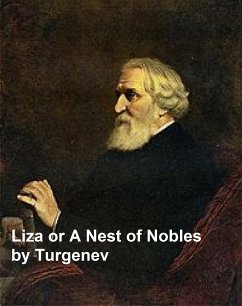
Liza; Or, "A Nest of Nobles" (eBook, ePUB)
Versandkostenfrei!
Sofort per Download lieferbar
1,99 €
inkl. MwSt.
Weitere Ausgaben:

PAYBACK Punkte
0 °P sammeln!
In "Liza; Or, 'A Nest of Nobles,' Ivan Turgenev intricately weaves a poignant narrative that captures the complexities of Russian aristocracy and the societal entrapments of its young protagonists. Set against the backdrop of decaying noble estates, the novel employs a rich, lyrical style, blending psychological insight with vivid characterizations. Turgenev's keen observations of social customs and class disparities present a microcosm of 19th-century Russia, where personal aspirations clash with familial obligations, creating a tapestry of emotional depth and irony. Turgenev, himself a produ...
In "Liza; Or, 'A Nest of Nobles,' Ivan Turgenev intricately weaves a poignant narrative that captures the complexities of Russian aristocracy and the societal entrapments of its young protagonists. Set against the backdrop of decaying noble estates, the novel employs a rich, lyrical style, blending psychological insight with vivid characterizations. Turgenev's keen observations of social customs and class disparities present a microcosm of 19th-century Russia, where personal aspirations clash with familial obligations, creating a tapestry of emotional depth and irony. Turgenev, himself a product of the Russian gentry, was profoundly influenced by the contradictions of his society. His upbringing amidst privilege, paired with a nascent awareness of social injustices, led him to explore themes of love, class, and individuality in his work. This tension between personal desire and societal expectation is central to "Liza," reflecting Turgenev's broader literary project of questioning the moral responsibilities of the privileged class. For readers seeking an insightful exploration of love and duty within the aristocracy, "Liza; Or, 'A Nest of Nobles'" is a must-read. Turgenev's nuanced portrayal of its characters invites readers to ponder the cost of societal expectations while immersing them in a beautifully crafted narrative that resonates with both timelessness and specificity.
Dieser Download kann aus rechtlichen Gründen nur mit Rechnungsadresse in A, B, BG, CY, CZ, D, DK, EW, E, FIN, F, GR, H, IRL, I, LT, L, LR, M, NL, PL, P, R, S, SLO, SK ausgeliefert werden.













